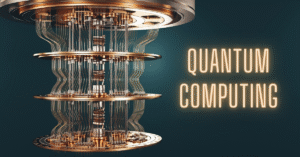
Quantum computing is an advanced computing technology that uses quantum bits (qubits) instead of classical bits. Unlike traditional computers, which work on binary states (0 or 1), qubits can exist in multiple states simultaneously (superposition) and can be entangled, making computations exponentially faster. For UPSC, understanding the basics of quantum computing is essential as India is investing heavily in this field under the National Quantum Mission (2023–2031).
Key Points for UPSC:
-
Uses qubits, superposition, and entanglement.
-
Can solve problems in cryptography, AI, drug discovery, and climate modeling.
-
India’s National Quantum Mission aims to develop quantum computers with 50–1000 qubits.
क्वांटम कंप्यूटिंग – भविष्य की तकनीक
क्वांटम कंप्यूटिंग एक उन्नत कंप्यूटिंग तकनीक है जो पारंपरिक बिट्स की जगह क्वांटम बिट्स (क्यूबिट्स) का उपयोग करती है। पारंपरिक कंप्यूटर केवल 0 या 1 पर काम करते हैं, जबकि क्यूबिट्स एक साथ कई अवस्थाओं (सुपरपोज़िशन) में रह सकते हैं और आपस में एंटैंगलमेंट के जरिए जुड़े होते हैं, जिससे गणनाएँ कई गुना तेज हो जाती हैं। UPSC के लिए यह महत्वपूर्ण है क्योंकि भारत ने हाल ही में नेशनल क्वांटम मिशन (2023–2031) की शुरुआत की है।
UPSC के लिए मुख्य बिंदु:
-
क्यूबिट्स, सुपरपोज़िशन और एंटैंगलमेंट का उपयोग।
-
क्रिप्टोग्राफी, कृत्रिम बुद्धिमत्ता, दवा निर्माण और जलवायु मॉडलिंग में उपयोग।
-
भारत का लक्ष्य 50–1000 क्यूबिट्स वाले क्वांटम कंप्यूटर बनाना।




